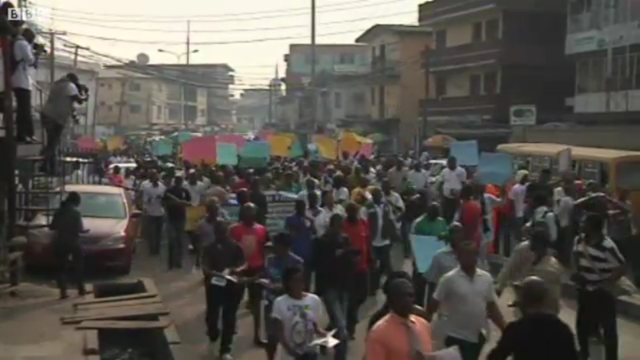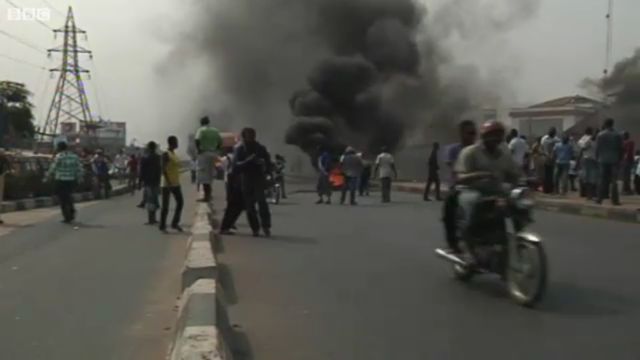‘Searing anger’ as Nigerians protest fuel price increase
By Stephanie Busari, CNN
4 January 2012 (CNN) – Car tires were set on fire and gas stations blockaded as hundreds of Nigerians took to the streets to protest the removal of fuel subsidies that saw the price of petrol more than double virtually overnight. Angry Nigerians chanted anti-government slogans and brandished placards in a largely peaceful protest Tuesday against the removal of government subsidies. In what has been described as a “callous New Year gift,” the government ended its fuel subsidy Sunday, bringing the cost of a liter of gasoline from 65 naira (40¢) to 141 naira, (86¢) Nigerians say this is the last straw in a country rich with oil reserves but with poor infrastructure and impoverished citizens who live on less than $2 a day, according to U.N. figures. Shade Ladipo, 29, was one of those who marched for hours in Lagos, the country’s economic capital, where some major districts were shut down by protestors. “The atmosphere has been charged. We were stopping cars from moving, we told them to park their cars and join us. Many people parked their cars and joined in. Even the police have been calm and not hostile to us. They know that this rise affects everyone, even them. ” Ladipo added that she and many Nigerians accepted the need for a price rise but accused the government of bringing the increase abruptly and without prior warning it would happen on January 1. “Nothing has been put in place for this,” she said. “We still don’t have light. The roads are terrible. It was already hard to live in Nigeria. This will make life even worse. We are angry and we’re not going to take this,” she added. […] Despite being one of Africa’s largest oil producers, Nigeria has no functioning refineries and has to import fuel. […]
‘Searing anger’ as Nigerians protest fuel price increase 
January 3 (BBC) – One protester has been killed as thousands of Nigerians have demonstrated against the removal of a fuel subsidy, which has led petrol prices and transport fares to double. Officials say the man was killed by “mob action” in Kwara state, while witnesses say he was shot by police as they tried to disperse protesters. There were marches in Lagos and other cities around the country. Nigeria is Africa’s biggest oil producer, but imports refined petrol. Police fired tear gas at youths in the commercial capital, Lagos, after they blocked main roads, set up burning barricades and tried to force petrol stations to close. However, the BBC’s Tomi Oladipo in the city says the main march passed off peacefully, with demonstrators chanting anti-government slogans. Analysts say many Nigerians regard cheap fuel as the only benefit they get from the nation’s oil wealth. Nigeria’s trade unions have said they will call a strike and are meeting on Wednesday to decide on the plans. Tuesday is the first working day since the measures were announced on 1 January. The demonstrator was killed in Kwara’s state capital, Ilorin. There have been protests in numerous parts of the country, including Lagos, Ibadan, Lokoja, Nasarawa and Kano, where about two dozen people were arrested as they gathered. Our reporter in Lagos says the city is not as busy as it normally is, with many people stranded as they cannot afford the new transport fares after going away for the holidays. Police in the capital, Abuja have blockaded Eagle Square, where protesters had planned to gather. On Monday, police fired tear gas to disperse some 200 people who had gathered in the capital, chanting: “Remove corruption, not subsidy.” […]
Nigerians protest at removal of fuel subsidy 
January 4 (AP) – Protesters furious over spiralling petrol prices started fires on a motorway and at least one person was killed in the unrest after Nigeria’s government scrapped a subsidy that had kept fuel costs down for more than 20 years. One union leader described the government’s hugely unpopular move as “immoral and politically suicidal” and urged Nigerians to resist “with everything they have”. But yesterday’s protest showed that, once unleashed, the pent-up anger of the masses could be hard to curtail. Angry crowds vandalised petrol stations, intimidated owners into keeping their pumps unused and attacked a soldier, showing how easily the fragile peace in Africa’s most populous nation could lead to chaos. One man threw cans of engine oil off the racks at a petrol station and tried to damage pumps. After union leader and chairman of the Joint Action Front, Dipo Fashina, asked the man to stop vandalising the station, he did, but later started one of the first bonfires of the protest in the middle of the motorway. Other activists marched to the protest songs of the late Afrobeat pioneer Fela Anikulapo-Kuti who fought against the injustices of military rule in Nigeria. His musician son Seun walked shirtless among the demonstrators, as his father used to, and also made attempts to keep things civil. An Associated Press reporter at the scene in Lagos said the protest had started with activists wielding signs and walking down a major route, but before long angry protesters lit bonfires and vandalised at least three petrol stations. In the central city of Ilorin, another violent protest where policemen fired tear gas left a man dead. The National Labour Congress accused the police of shooting the “anti-fuel hike protester”. But Kwara state police spokesman Dabo Ezekiel said the man was stabbed by motorcycle-taxi drivers angry because they believed he was against their cause. Mr Ezekiel could not say what triggered the attack. The Nigerian government’s quiet announcement over the long New Year weekend that the popular subsidy was being ended triggered a wave of protests in Africa’s most populous nation of 160 million. The government says it will use £5.1 billion in savings to make much-needed infrastructure improvements, but previous attempts to even tamper with the subsidy have been met with nationwide protests. Yesterday the rapidly growing group of Lagos protesters were going from petrol station to station, telling owners not to sell fuel at the increased prices of about £2.24 a gallon (60p a litre). That is more than double what consumers paid only days ago for the fuel desperately needed to power the generators that keep many businesses running in Nigeria, where the national electricity supply can be described as sporadic at best. […]
